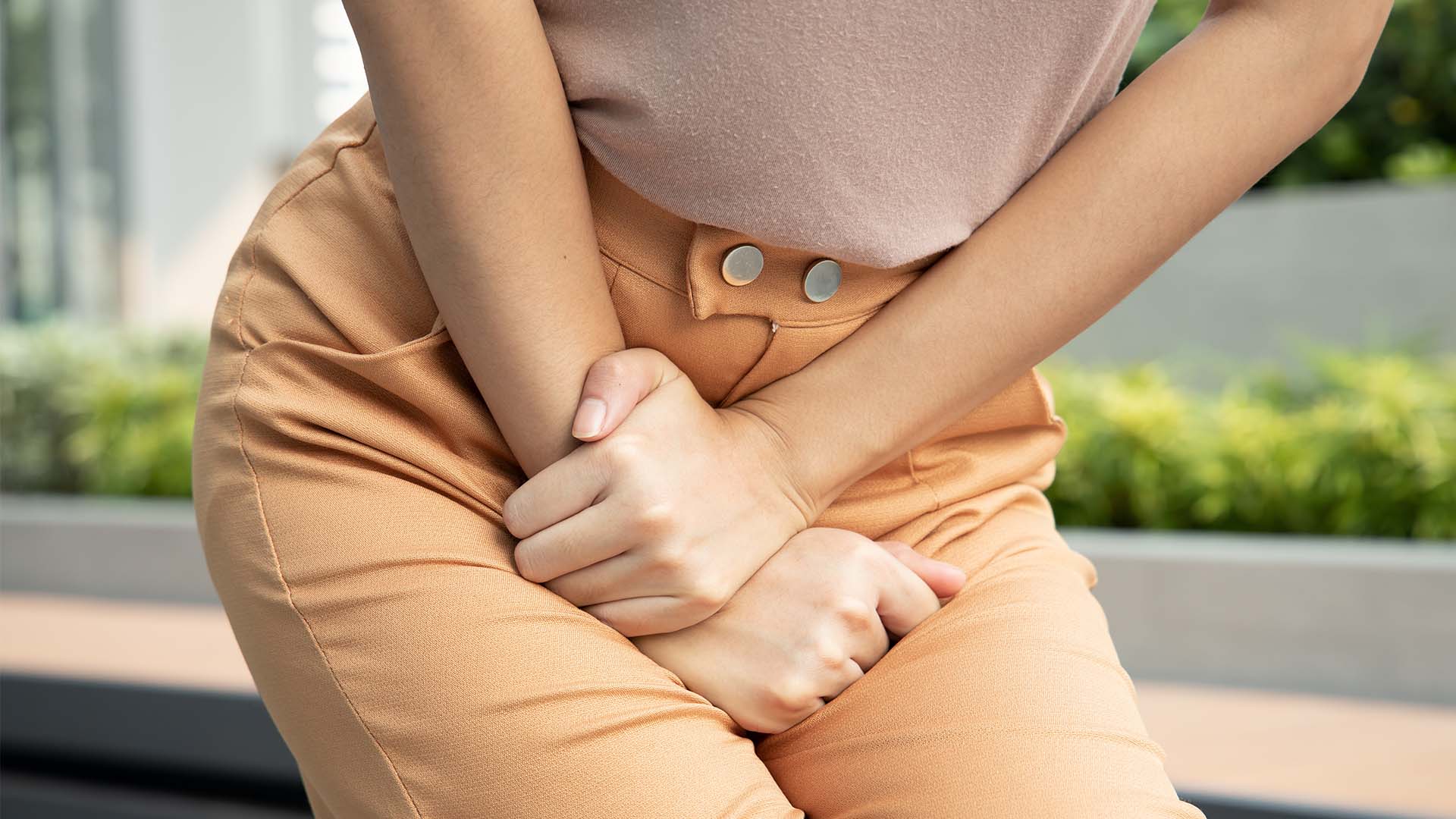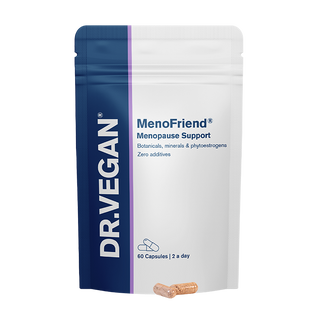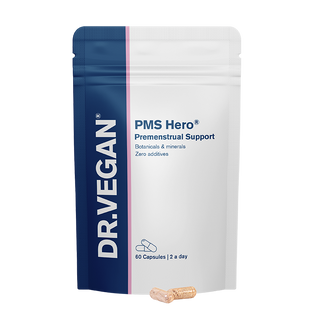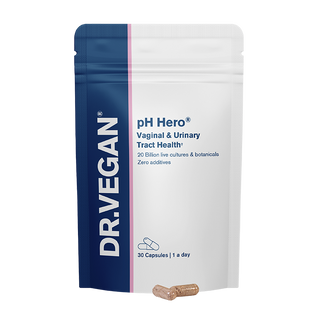What you need to know about UTIs

Urinary tract infections (UTIs) are common and affect millions of women. A UTI may occur in any part of the urinary tract, from the the bladder to the kidneys, including the 'ureters', which are tubes connecting the kidneys to the bladder. More than half of women will have at least one UTI at some point during their life, while UTIs are rare among men.
Our latest consumer survey of over 1,200 women revealed that one-third of the women experienced vaginal infections, including bacterial vaginosis (BV), urinary tract infections (UTIs), or thrush, with over 10%* dealing with these issues daily.
Our expert nutritionists explain UTIs, what causes them and how you can avoid the risk of a UTI.
What causes a UTI?
UTIs start when bacteria enter the urinary tract through the urethra and then enter the bladder. The bacteria that most commonly cause UTIs is 'Escherichia coli', also known as 'E. coli', which originates from the colon. UTIs are much more common in women than men due to women's biology and the close proximity between the anus and urethra.
There are lots of ways E. coli can be introduced to the urinary tract and increase the risk of a UTI, including:
- Sexual intercourse may introduce bacteria into the urethra, leading to a UTI.
- Certain types of contraceptives increase the risk of UTIs, mostly spermicides and diaphragms.
- Wiping the wrong way. Wiping back to front increases the risk of spreading bacteria from the colon to the urinary tract.
There are a number of other factors that increase the risk of developing a UTI, including menopause and post menopause, having a reduced immune function and using a urinary catheter.
The difference between a UTI and a yeast infection
A UTI is caused by bacteria (usually E. coli), while a yeast infection is caused by an overgrowth of yeast (usually 'candida albicans').
The symptoms of a yeast infection include redness, itching or burning, and a thick, white discharge from the vagina. You may also be interested in 'What is bacterial vaginosis'.
The symptoms of a UTI include pain and burning when urinating, discomfort or pain in the pelvic area, a frequent urge to urinate, smelly urine, cloudy urine, or the presence of blood in the urine. Learn more in 'What colour should your urine be'.
Treatments for a UTI
There are a number of treatments for preventing and combatting UTIs, including certain drinks, natural supplements, as well as medication.
pH Hero® is an advanced natural formula for preventing UTIs, including powerful probiotics and botanicals to restore vaginal flora, protecting against harmful bacteria, UTIs, vaginal dryness and discomfort. 77% of customers feel the difference and 90% feel the difference within 8 weeks. The most common issues pH Hero® was found to address include: itchiness, dryness, thrush, UTIs and frequent urination.
Doctors can treat UTIs with antibiotics after you provide a urine sample that will be sent to the lab for testing. Pain-relieving medications may help relieve the pain and discomfort associated with a UTI. If you are prescribed antibiotics for a UTI, it's essential to take the entire course of antibiotics as prescribed. If you start feeling better before finishing the medication, you should still finish the course of antibiotics, because this will help to prevent the infection from returning, worsening, or contributing to antibiotic resistance.
If you're taking antibiotics, it is also advisable to take a course of probiotics at the same time or after completing your course of antibiotics. Antibiotics can harm the good bacteria in your gut and vagina, so probiotics such as pH Hero® or the award-winning Gut Works can restore and repopulate your gut with healthy bacteria. Learn more in 'Should you take probiotics after antibiotics'.
If left untreated, a vaginal UTI can spread to the kidneys, causing a more severe infection known as 'pyelonephritis'. Symptoms of a kidney infection can include generally feeling unwell, fever, chills, nausea, and back pain. A kidney infection requires immediate medical attention and may require hospitalisation.
How to prevent a UTI
There are several things you can do to help prevent UTIs. These include:
- Drink plenty of water: Staying hydrated helps flush bacteria out of your urinary tract.
- Urinate frequently: Don't hold your urine for long periods.
- Wiping from front to back: This helps prevent bacteria from the anus from spreading to the urethra.
- Clean before and after sexual intercourse: This helps reduce the risk of introducing bacteria into the urethra. You may also enjoy reading about the best and worst foods for sex drive.
- Avoid irritating feminine products: Avoid using feminine hygiene sprays, douches or powders, as they can irritate the urethra, which may increase the risk of infection.
MenoFriend®

What else can help prevent a UTI?
Your dietary choices and the types of foods you eat can also help protect you against UTIs. If you haven't already, complete your free online Diet Profile to understand the nutrients your body needs, and what it may be missing.- Cranberry: Cranberries contain 'proanthocyanidins' which prevent E. coli from adhering to the bladder wall. This is why cranberry juice is a very popular choice of drink among women, particularly those treating or susceptible to UTIs. Be careful to choose a sugar-free cranberry juice. You may be interested in trying our Cranberry Refresher Mocktail recipe.
- Probiotics: Only 29% of the women in our recent survey currently take a probiotic to support their vaginal health, despite the significant connection between the gut microbiome and the vagina. Probiotics can correct the balance of microflora in the colon and prevent E. coli from spreading to the urinary tissues. Learn more about how your gut and vagina are linked. pH Hero® is the advanced vaginal probiotic including 20 billion CFU, prebiotics, cranberry, stinging nettle extract, Sea Buckthorn and vital nutrients for complete vaginal and urinary tract health.
- High-fibre diet: Fibre provides a food source for the natural probiotics in your gut. It supports a healthy microflora and in turn a healthy microflora of the urinary tract. Learn more in 'Why fibre in your diet is essential'.
- Low-sugar diet: Sugar and sweeteners are bad news for UTIs. They decreases the immune function and encourages the growth of UTI-causing bacteria. You may also enjoy reading 'Is sugar that bad for you?'.
Jessica Childs explains the role of nutrition in vaginal and bladder health.
*This article contains data from UK surveys conducted by DR.VEGAN®. All survey findings reflect our own research efforts and have not been influenced or verified by any external organisations or third-party entities.
You may also enjoy reading:
- What colour should your urine be?
- How your gut and vagina are linked
- What is Bacterial Vaginosis?
- What is period poo?
- The surprising life impacts of PMS
- What PMS type are you?
- Nutrition for PMS symptoms
Discover our range of award-winning vegan probiotics, vitamins and supplements.
Not sure is your diet is supporting your needs? Create your free Diet Profile and understand your diet and what it may be missing.
Want to hear more from our nutritionists? Sign up to our email newsletter for insights and exclusive offers:


















